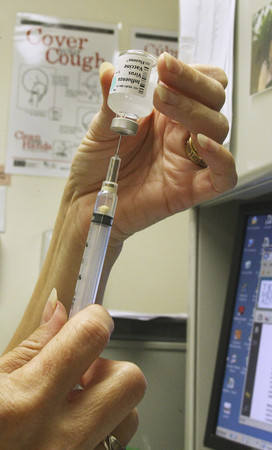Board to decide if medical assistants can administer flu shots
No Botox injections. And now no flu shots.
Medical officials learned last week that medical assistants had long been illegally administering the anti-wrinkle drug Botox. Now it turns out that the same law would apply to critical shots such as those needed to battle swine flu.
Louis Ling, the Nevada State Board of Medical Examiners' executive director, recently cited a 30-year-old law when he admonished physicians not to let medical assistants inject Botox into patients.
With the state's medical community up in arms about what medical assistants can and cannot do, the board will meet in emergency session Friday. The intent is to legalize the ability of medical assistants to give flu shots and other vaccinations, but not let them inject patients with Botox and other cosmetic drugs.
People can always get flu shots from physicians and nurses, but Gov. Jim Gibbons worries that without action, there won't be enough health care professionals to give Nevadans a shot in the arm they need to fight off both seasonal and swine flu.
"We want to make sure we don't hinder the ability of the public to get flu shots," said Dan Burns, a spokesman for the governor.
"It's in black and white," said Larry Pinson, executive director of the Nevada Board of Pharmacy. "Medical assistants are not mentioned as being able to even give flu shots.
"It appears that doctors think they can just deputize people to do these things."
Burns said he expects the medical board to craft a new regulation that allows medical assistants to inject patients with antibiotics and vitamins and vaccines against a variety of diseases.
Burns and Doug Cooper, chief of investigations for the medical board, say medical professionals have been repeatedly calling their offices for guidance after stories last week revealed that medical assistants were illegally administering drugs. Cooper said that guidance will be e-mailed to about 6,000 local physicians in the coming days.
Burns said that if the regulation is not changed, lines at doctors' offices for flu shots would be "around the block."
At the same time, if the current regulation were to stand, "this would also put a lot of medical assistants out of work, and that's certainly not something we need right now."
Dr. Ivan Goldsmith, a Las Vegas internist, said well-trained medical assistants can do the job safely in doctors' offices. Relying solely on doctors, nurses and physician assistants to give shots would be far too expensive, he said.
Goldsmith also noted that Las Vegas already has a nursing shortage.
"I agree that the Botox is serious and medical assistants shouldn't be doing that, but we shouldn't go too far," he said.
"There's a lot of confusion," Cooper said. "But I want doctors to know that until there is a new regulation, medical assistants cannot give any shots. It's illegal."
Assemblywoman Sheila Leslie, D-Reno, whose health committee probed the hepatitis outbreak in Southern Nevada, said Wednesday she hopes any new regulation would spell out how to train medical assistants. Nevada law does not list educational requirements or training for the position. Nevertheless, many medical assistants receive certificates from vocational schools.
"I'd like to know that the people giving me a shot know what they're doing when it comes to the body and infection control," Leslie said.
Cooper said he could not reveal what might be in the new regulations.
In California, medical assistants can give flu shots and inject drugs, including narcotics, but cannot inject Botox or collagen, another cosmetic filler.
They must have at least 20 hours of training in giving injections and drawing blood in addition to training including course work in anatomy and sterilization techniques. The requirements have been in place nearly 20 years.
Officials at Las Vegas vocational schools were stunned to learn the medical assistants they train are not allowed under law to administer injections.
"We've been preparing them to do that for 15 years," said Joanne Lemin of the Nevada Career Institute. "How can this happen?"
Karen Stacey, associate director of Pima Medical Institute, was surprised as well.
"I don't understand how this happened," she said.
Ling said last week he saw no reason to discipline doctors who allowed medical assistants to administer Botox because "they didn't know it was wrong."
But Dr. Leonard Kreisler, a former chief of staff at University Medical Center, said, "Doctors get copies of the laws."
"Medical assistants were hired instead of nurses because they were cheaper."
Dr. Benjamin Rodriguez, a medical board member, plans to recuse himself from voting on the new regulation.
That's because of "his involvement in the issue," Burns said.
Rodriguez used medical assistants to administer Botox to patients, but only because of misinformation, said Noelle Rodriguez, his daughter and public relations manager.
She e-mailed to the Review-Journal a copy of a 2006 board newsletter in which the former executive director of the medical board, Tony Clark, wrote that medical assistants can inject medication if the physician "has verified the type and dosage and the injection is intramuscular, intradermal or subcutaneous."
"That's what my dad went by," Noelle Rodriguez said.
She said he has stopped the practice and is awaiting the new guidelines.
Contact reporter Paul Harasim at pharasim@reviewjournal.com or 702-387-2908.




























